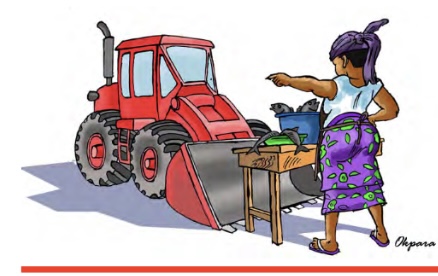DATELINE LAGOS, circa 1935 – Standoff at Ereko
By Femi Olugbile
When the rumour first began to make the rounds that the government had decided to move Ereko Market to Oluwole, the sense of alarm rippled through all the markets of Lagos. It was the largest meat and fish market in the town, and a major source of revenue for the Lagos Town Council.
The official explanation was that the market needed more space. True, it was difficult to move inside Ereko without stepping on somebody else’s foot. But that was the nature of a market. And no market was more important than Ereko. There was a saying – ‘Whatever you’re looking for, you will find it at Ereko’. Another popular saying on the streets was ‘You have not gone to the market until you reach Ereko’.
Just as important as the commerce was the fact that it was the headquarters of the Lagos Market Women’s Association, and the operational base of Madam Pelewura, by common consent the Iyaloja of Lagos, member of the Ilu Committee, staunch supporter of Eleko Esugbayi through all the years of travail and eventual triumph, prominent presence at Iga Idunganran, founding member of the Nigerian National Democratic Party, and acknowledged voice of all the women in the length and breadth of Lagos. Some people interpreted the decision of the government as an attack on the Market Women’s Association.
The women were furious. Iyaloja Pelewura instructed her clerk Akowe to draft a letter of protest to the Town Council. She wanted Oged, the son of her friend Macaulay, to go through the draft before she would place her thumb print on it. Oged had travelled to Oyo on some personal business and was due to return in a few days.
But matters moved quickly to a boiling point. One morning a few days later, traders arrived at the market to find a bulldozer at the site, poised to commence demolition. Standing around were a detachment of fierce-looking policemen.
As usual, bad news travelled like lightning, and a crowd quickly converged at the site.
As soon as Pelewura arrived with her entourage, everyone could sense there was going to be trouble. She moved past the line of policemen and headed straight for the bulldozer that stood poised, with its engine running. ‘What are you doing here? Get out of our market’.
Her voice was drowned out by the noise of the engine, but her intention was clear. She proceeded to sit down on the bare ground, directly in the line of movement of the vehicle. ‘If you want to demolish Ereko, you will have to go over my dead body.’
The women around her, taking their cue, sat down in line, forming a human barrier. The policemen stood watching the scene impassively. The bulldozer was revving its engine.
The women broke out in songs of solidarity and defiance.
There was a stir as more policemen arrived. They were led by a white officer who carried a swagger stick and had a pistol in his belt. Several policemen headed for the front rank of the singing women.
‘I am arresting you in the name of the government of Nigeria,’ the British officer announced dramatically, standing in front of Pelewura, his hand on his pistol.
‘Don’t you dare lay your hand on me!’ Pelewura ordered sharply as one of the policemen tried to help her to her feet. She got up and, without haste, entered the police vehicle that had backed up close. Other women followed her.
The vehicle drove off, heading towards Central Police station. There were still many women sitting in front of the bulldozer.
Oji Gobi, Iyaloja’s assistant had gone to the toilet. She returned in time to see Pelewura stepping into the Police vehicle. She ran forward to join her. The Police barred her way. ‘Yeye! Yeye!’ she screamed, bursting into tears. Pelewura looked back, made a reassuring gesture with her hand. Oji watched the vehicle depart.
Oji immediately urged the crowd of women standing nearby to use every means at their disposal to spread the message to all the markets in Lagos that Iyaloja had been arrested by the Police. She herself headed in the direction of Kirsten Hall to alert Herbert Macaulay, their supporter and defender in times of trouble. Macaulay was at a meeting in his office when she arrived. He immediately called on a lawyer to go to the Police station. This affront, he decided, would form the headline news in tomorrow’s ‘The Daily News’.
Within the space of a few hours, hundreds of women had streamed in from various parts of the town to join the protest. Even before the lawyer arrived at the Police station, Pelewura and most of those arrested with her had been released.
When Pelewura returned to Ereko there was a loud cheer, and the crowd broke into songs of victory.
The engine of the bulldozer had stopped roaring. The remaining Police departed silently.
As dusk fell, the lawyer returned to inform Pelewura that three women were still in custody, accused of assaulting Policemen. The news immediately dampened the general mood. Pelewura called her clerk Akowe to a corner and dictated a letter that he was to take to the office of the Administrator of the Colony at first light the next day.
‘…We will be greatly thankful if you will please telephone the Police or Magistrate for their discharge…’ her letter went, referring to the three women. ‘I shall be in your office today at 11am…’
Well before 11am the following day, the detainees regained their freedom.
During the night, the caterpillar made its lumbering way out of Ereko.
Nothing more was said about the movement of the market to Oluwole.
Much later, the market would indeed be relocated to spacious grounds in Egerton Square. This followed a process of consultation between the Town Council and all stakeholders, including the market women.
(an excerpt from the forthcoming book ‘PELEWURA’)

